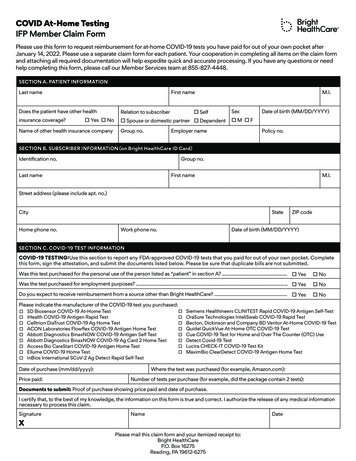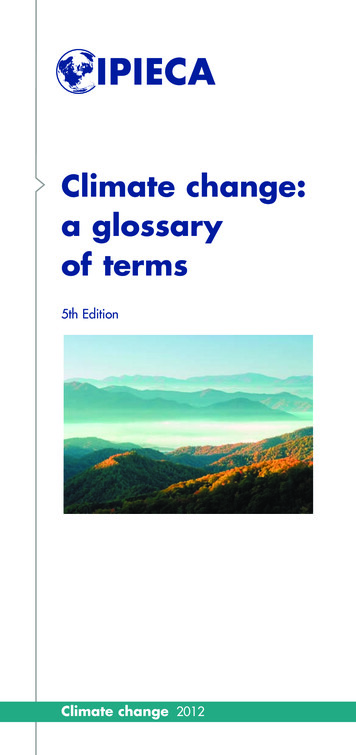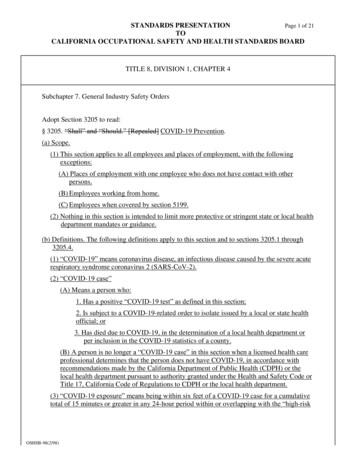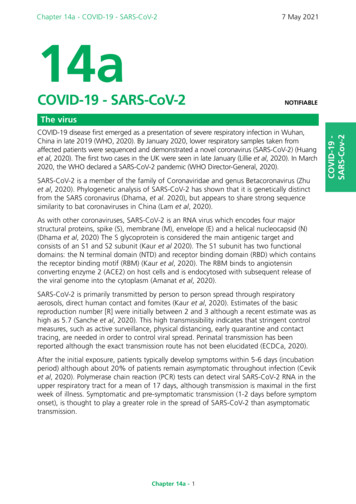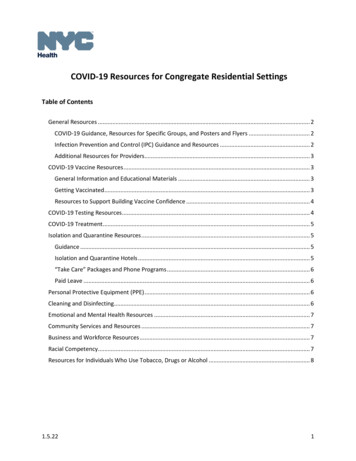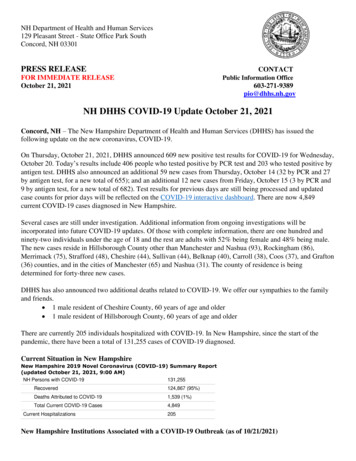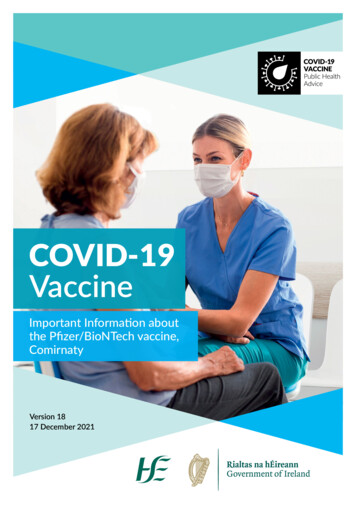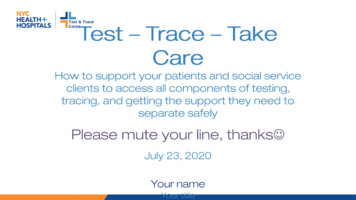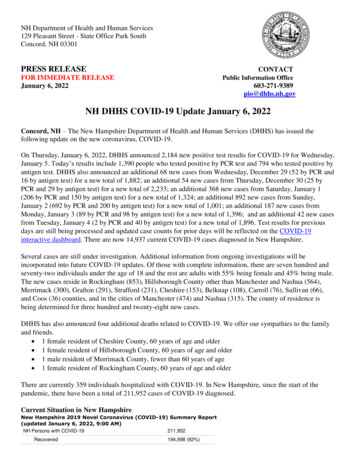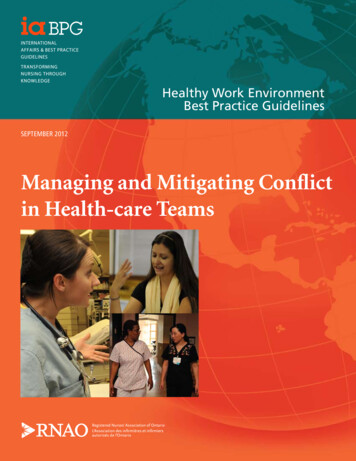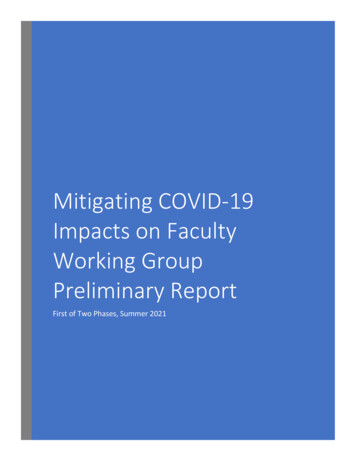
Transcription
Mitigating COVID-19Impacts on FacultyWorking GroupPreliminary ReportFirst of Two Phases, Summer 2021
Executive SummaryOn January 26, 2021, the Academic Council wrote President Drake with recommendations on mitigatingCOVID-19 impacts on faculty advancement, morale, work-life balance, and dependent careresponsibilities. In response, President Michael V. Drake requested that Provost Michael T. Brown formthe Mitigating COVID-19 Impacts on Faculty Working Group (MCIF-WG), formalized on April 29, 2021with the appointment of 17 members (see roster in appendix four). The MCIF-WG was charged with thereview and prioritization of fifteen “immediate” and six “long-term” recommendations from theAcademic Council (AC), the assessment of actions already taken by campuses to mitigate COVID-19impacts on faculty, and advising UCOP on data and metrics to help UC define the issues UC is facing as aresult of COVID-19 and track the progress UC makes in addressing them.The focus of the MCIF-WG in early meetings was on the assessment of actions already taken bycampuses and the prioritization of AC recommendations. The goal in prioritizing the recommendationswas to identify actions the University system and campuses could take swiftly in Fall 2021 to respond toareas the MCIF-WG members viewed as being of greatest concern to faculty across the system. MCIFWG members ranked the AC recommendations according to priority level (high, medium, or low),deliberately narrowing its focus on proposing actions to address the three Academic Councilrecommendations members ranked as highest priority. It took this approach with the objective ofenabling the University system and campus leadership to act swiftly on a few of the most pressing andtimely areas of concern: academic review and appraisal, funding for research recovery, and campuslevel funding to support approved teaching duty modifications. This initial report focuses on these areasso that campuses have options immediately available to them for the 2021-2022 academic year. Asecond and final report will be issued by spring 2022.Highest Priority Academic Council RecommendationsMCIF-WG members identified three AC recommendations that were clear outliers in the number ofmembers that ranked each as high priority: recommendations four, eleven, and three. ACrecommendation number four, relating to academic review and appraisal, asks campuses to “adjustexpectations for promotions and merit advances to conform to Achievement Relative to Opportunities(ARO) principles.” ARO principles, as described in the recommendation, “enable merit and promotionreviews to evaluate candidates fairly based on their individual review-period professionalaccomplishments by taking into account unexpected or disruptive circumstances during that period thatmay have curtailed the candidate’s normal ability to achieve expected outcomes.” This recommendationalso advises on COVID statements in file review, which are widely in use across all campuses but withvariance in how faculty are instructed to employ them. AC recommendation numbers eleven and threerequest the creation of funding programs to recover from research losses and to provide campus-levelsupport for approved teaching duty modifications whenever department resources fall short.Subsequently, the MCIF-WG did a deep dive on these three AC recommendations and was able toidentify actions that could be taken swiftly to address COVID-19 impacts for which faculty haveexpressed particular concern across the system. In identifying actions, members were cognizant of howcampuses differed with respect to culture, local priorities, resource levels, and in programs or measuresthat had already been enacted.1
MCIF-WG Recommendations Developed in Response to AC RecommendationsWith these differences in mind, the MCIF-WG organized identified actions into three separaterecommendations for campuses to implement in response to the three highest-priority ACrecommendations and included options to enable campus flexibility based on their circumstances.Providing options is designed to balance the need for campus flexibility and producing substantive andequitable outcomes that would address COVID-19 impacts on faculty across all campuses. MCIF-WGrecommendations are summarized below, but can be found in more detail on pages 14 - 20. See alsodiagram on page three for a visual on how MCIF-WG recommendations relate to the three highestpriority AC recommendations. For clarity, the report distinguishes between Academic Councilrecommendations and the subsequent Working Group recommendations by the acronyms “AC” and“MCIF-WG.”MCIF-WG Recommendations One and Two aim to address AC recommendation number four regardingacademic review (see pages 14 - 17). MCIF-WG Recommendation One requests that all campusesrebrand COVID impact statements as a “COVID Opportunities and Challenges Statement” and ensurethat the use of COVID statements in file review adhere to best practices identified by the MCIF-WG. Ifnot already doing so, it requires campuses to draft language on how departments are to interpret andapply ARO principles and to incorporate department-level statements into the file review process to beused as a means to benchmark performance across disciplines. It also requests that campuses provideguidance to faculty reviewers who submit letters to a candidate’s file. Reviewers should consider thecandidate’s performance in light of COVID impacts as well as the candidate’s noteworthy contributionsduring the review period.MCIF-WG Recommendation Two recognizes that some campuses have relied more on the file reviewdeferral process while others have actively encouraged faculty to submit files with an understandingthat they would be holistically reviewed using ARO principles. It provides campuses with two optionsbased on the scenario that best matches current campus practices. For campuses relying heavily on thefile deferral process, the WG recommends that they commit to retroactive pay and advancement forqualifying faculty. Because of the cascading effects of the pandemic on faculty careers, the WG agreedthat these measures should be in effect for five years.MCIF-WG Recommendation Three seeks to address AC recommendation numbers eleven and three. Itasks campuses to implement funding programs for research recovery (including larger and smaller scaleresearch activities) and to provide campus-level funding for approved teaching duty modifications thatcan be sustained or expanded over five years. This MCIF-WG recommendation offers options based oncampus resource constraints (see pages 18 – 20). Eligibility for these programs would be open to allfaculty. At the minimum, the most resource-constrained campuses should have a modest centrallymanaged need-based grant program in place. For moderately resource-constrained campuses, the WGasks that a centrally managed application-based funding program be established with a set range ofaward amounts that can be used for either approved teaching duty modifications or research recovery.Campuses that are least resource constrained should have one centrally managed independent fundingprogram for research recovery with more sizable grants that faculty can apply for as well as a separateprogram for campus-level funding to support teaching duty modifications, with funds being distributedand managed at the school level.2
ConclusionThe MCIF-WG is reconvening to further consider the other 18 Academic Council recommendations thatare similarly substantive. Some of the other 18 AC recommendations have links to the three beingaddressed herein, so the WG may identify other actions that would further refine the implementation ofthe MCIF-WG recommendations proposed in this preliminary report.The WG recognizes that the system and campuses both continue to face resource constraints, but viewscosts associated with the highest-ranked recommendations as having sufficient importance to warrantprioritizing the identification of funds that can be allocated to these purposes. It encourages leadershipto seriously consider the three MCIF-WG recommendations put forward on pages 14 - 20 withassociated options and how these can be implemented, or in the case of campuses that have alreadytaken some of these actions, how programs can be sustained or expanded for up to five years.Academic CouncilRecommendationsSummary of MCIF-WG recommendations and their relationship to the top-rankedhigh priority Academic Council recommendations. See pages 14 - 20.AC Recommendation 4Adjust expectations forpromotions & meritadvances to conform to“Achievement Relative toOpportunities” principles(with COVID impactstatement).AC Recommendation 11Extend campus fundingmechanisms for researchrecovery to impactedfaculty, including forcosts related to graduateand postdoc support.AC Recommendation 3Establish campus-levelfunding to supportapproved teaching dutymodifications wheneverdepartment resourcesfall short.Associated MCIF-WGRecommendationsAcademic Review and AppraisalMCIF-WG Recommendation OneAll campuses should ensure COVID statementsadhere to best practices identified by the MCIFWG and require department-level statements.MCIF-WG Recommendation TwoEach campus should select Recommendation TwoOption A or B based on whether it has promotedfile review deferral or has encouraged filesubmission to align with “Achievement Relativeto Opportunities” principles (see pages 14 - 17 toreview MCIF-WG recommendations and options).Funding ProgramsMCIF-WG Recommendation ThreeEach campus should selectRecommendation Three Option A, B,or C, which ask campuses toimplement funding programscommensurate with campusresource levels and that aredesigned to be sustainable or toexpand over five years (see pages18 - 20 to review MCIF-WGrecommendations and options).3
I. IntroductionIn March 2020, under the direction of governing authorities and with the counsel of public healthofficials, the University of California suspended onsite operations of all affiliated locations in response tothe novel coronavirus, with appropriate exceptions for locations and staff performing health-related orother essential functions. These shelter-in-place orders continued to varying degrees through the end of2020 and most of 2021. They played an important role in controlling the spread of COVID-19, keepinghospitals and other health centers from becoming overextended, and protecting the health and safetyof everyone, particularly vulnerable populations.In the face of pandemic-related challenges, the University had to be exceptionally adaptive in advancingthe three pillars of its mission in teaching, research, and public service, even as campus resourcesdwindled from normal levels. Faculty were on the forefront of the changes necessitated by COVID-19and profoundly felt its impacts in their work and personal lives, with disparate impacts based on genderand race. Many faced increased dependent care responsibilities and some were directly affected by thevirus or saw their loved ones suffer from it.Even so, faculty made a dramatic pivot to conducting instruction remotely with minimal preparation fornew instruction media. As labs and other research facilities were closed, many had to absorb resultingsunk costs, literally as well as in time and energy devoted to research outcomes that could not be fullybrought to fruition. With the new challenges presented by COVID-19, there were no shortages forservice opportunities and many faculty during this time devoted limited time and energy toimplementing new practices in response to rapidly changing developments, demonstrating an admirablecommitment on holding the University to its standards of excellence.One of these service initiatives began in 2020, led by the University Committees on Faculty Welfare(UCFW) and on Affirmative Action, Diversity and Equity (UCAADE). These Committees, chaired by ShelleyHalpain and Javier Arsuaga, respectively, recognized early that any impact COVID-19 would have onfaculty whether with regard to career advancement, morale, work-life balance, or increased dependentcare responsibilities could have a commensurate long-term impact on the University’s capacity toproduce desired outcomes in teaching, research, and service as well as in diversity and equity goals.On January 26, 2021, Academic Council (AC) Chair Mary Gauvain, in a letter to President Michael V.Drake, endorsed a separate letter jointly drafted by UCFW and UCAADE that included fifteen shorterterm recommendations to mitigate against the direct impacts COVID-19 had on faculty and six longerterm recommendations that look at how the COVID-19-era could serve as a catalyst “to strengthen thevalues of the UC and to make the UC ‘the employer of choice’ for world class academics.” PresidentDrake’s response was to call for the organization of a working group comprised of Academic Senaterepresentatives and campus leaders to address the AC recommendations.The Mitigating COVID-19 Impacts on Faculty Working Group was instituted when Provost Michael T.Brown appointed Working Group members on April 29, 2021, with Provost and Executive ViceChancellor Mary Croughan and Academic Council Vice Chair (now serving as Chair) Robert Horwitz asCo-Chairs. The following preliminary report details the activities of the Working Group in the Summer of2021 and puts forward three MCIF-WG recommendations to address three AC recommendations,providing faculty across the system with the tools and conditions necessary to continue and elevate theUniversity of California’s trajectory of excellence.4
II. BackgroundAs prefaced in the introduction, the Mitigating COVID-19 Impacts on Faculty Working Group (MCIF-WG)originated at President Michael V. Drake’s request, which was informed by the Academic Council, theUCFW, and the UCAADE. UC Provost Michael T. Brown issued appointment letters to selected membersin April, forming the Working Group, which was shortly followed by the Working Group’s Charge in May2021. The Co-Chairs of the MCIF-WG are Provost and Executive Vice Chancellor Mary Croughan andAcademic Council Vice Chair Robert Horwitz.1. UCFW / UCAADEDevelops 21Recommendations2. Academic CouncilEndorses3. PresidentRequests WorkingGroup Formation4. Provost IssuesCharge andAppointmentsOngoing Individual Campus Responses to COVID-19The ChargeThe Charge for the Senate Administration Mitigating COVID-19 Impacts on Faculty Working Groupreflects the interests and concerns of all of the above stakeholders. 1 Provost Brown specifically chargedthe MCIF-WG with the following: “Reviewing the fifteen ‘immediate’ and six ‘long-term’ recommendations and advising on andprioritizing the specific actions that will mitigate the negative impact of COVID-19 on faculty,especially early-career faculty.” “Preparing an inventory of actions already taken by campuses to mitigate the impact of COVID19 on faculty and [advising] UCOP whether actions are better addressed at a system-level or bythe individual campuses.” “Advising UCOP on data and metrics that will help UC define the issues UC is facing as a result ofCOVID-19 and track the progress UC makes in addressing them.”The Charge laid out a plan that would include two stages, the first to take place in the summer of 2021and the second to take place in the following fall, and called for reports to be drafted for each stage withthe final report being completed in December 2021. This is the preliminary report. It puts forward MCIFWG recommendations with associated options that the WG proposes implementing immediately basedon their review and prioritization of the AC recommendations, explains how the WG arrived at identified1Foundational documents, including the Charge, are included as appendices for reference.5
actions, and provides an assessment of what has already been done either at the system or campuslevels to address prioritized AC recommendations. Other key documents have been included asappendices, including:1.2.3.4.5.6.7.Academic Council Endorsement of 21 RecommendationsPresident Michael V. Drake’s Response to the Academic CouncilThe MCIF-WG ChargeMCIF Working Group MembershipUCAP Guidance for Review of Academic Personnel Impacted by the COVID-19 PandemicDraft Pandemic Sabbatical Credit Program ProposalCampus StakeholdersThe focus of this preliminary report will be to address three AC recommendations the WG ranked as ofhighest priority with the intent to revisit 18 other recommendations when the members meet again inthe fall. It was determined that prioritization of the recommendations was necessary in order to meetone of the Charge’s objectives, which was to be able to begin implementation of some of the mostneeded actions swiftly. The three AC recommendations the WG ranked as top priority were:Academic Council Description (abbreviated) 2RecommendationFourElevenThreeAdjust expectations for promotions & merit advances to conform toAchievement Relative to Opportunities principles (with COVID impact statement)Extend campus funding mechanisms to impacted faculty for research recovery,including costs related to graduate and postdoc support.Establish campus-level funding whenever department resources fall short tosupport approved teaching duty modifications, fostering recovery of lostscholarly productivityThe WG recognizes the cultural and organizational differences between each of the campuses, includingdifferences in how each has responded to COVID-19 impacts on faculty to date, and has strived to buildroom for campus customization in how each approaches implementing the MCIF-WG recommendations.At the same time, the WG took into account the value of systemwide guidance in clarifying shared goals,maintaining consistency in application of policy across campuses, and ensuring that faculty across thesystem see areas of concern meaningfully and equitably addressed.MethodologyAs mentioned previously, the 21 recommendations developed by UCFW and UCAADE were categorizedaccording to the estimated timelines needed for implementation. In their original letter to the AC, theywrote, “We have divided our recommendations into two parts to emphasize the need for (a) urgentand immediate action (in the time frame ranging from this month through the next two to five years);and (b) to initiate discussion on how the University of California may address critical, systemicchallenges in order to create a University environment that values a diverse faculty and fosters equityRecommendation descriptions have been modified from the original language for clarity and to comport with thehow the MCIF-WG thought they should be implemented.26
and inclusion throughout its mission.” Fifteen recommendations fell in the first category with six in thesecond.Early on in the process, it was determined to focus the WG’s attention on the first 15 shorter-term ACrecommendations in this first stage given that one of the key objectives was to be able to implementactions swiftly in Fall 2021. The MCIF-WG is comprised of 17 members with representation largelybalanced across all campuses. Campus representatives include both faculty and administrators, withfaculty making up a slight majority in the WG.The WG held three meetings over the course of June and July 2021 (June 4, June 25, and July 13). Priorto the first meeting, each WG member received a “recommendation matrix” template with the firstfourteen shorter-term AC recommendations listed. 3 UCOP acknowledged themes and interrelationshipsbetween the AC recommendations and grouped them accordingly. These themes related to academicperformance review and appraisal, culture, equity, and funding. 4 Instructions to WG members askedthem to rank the priority level of the 14 recommendations as high, medium, or low, with limits on howmany could be ranked at each priority level. Four recommendations were allowed to be ranked as highpriority; five could be ranked as medium; and the remaining five recommendations would be ranked aslow.For each of the four recommendations WG members ranked as high priority, they were also asked toprovide suggested actions that could be taken over the summer, in the fall, and through five years’ time,as well as to explain the corresponding impact on their campus and challenges encountered inaddressing the issue. WG members also indicated whether they considered each to be better addressedwith a system or individual campus approach for each of the fourteen recommendations.Another of the first steps UCOP took prior to the first meeting was to put out a request for informationon the measures campuses had already taken to address COVID-19 impacts on faculty. All ten campusesresponded with information that was insightful and useful in understanding the broader landscape,where there were similarities in approach and where there were differences, whether big or small.The recommendation matrices submitted by the WG members combined with the campus actioninventories the campuses submitted to UCOP Academic Affairs provided key information andperspectives that would serve to structure and inform the WG’s kickoff meeting on June 4. For example,through analysis of the data matrices, UCOP Academic Affairs was able to determine which of thefourteen AC recommendations were highest-ranked in priority by most WG members. UCOP AcademicAffairs was then able to assess these rankings in light of inventory actions reported by campuses tounderstand the extent to which these actions were able to address the recommendation or whethergaps existed that could warrant further action.Recommendation fifteen was not included as it was taken as a given that it would be implemented and pertainsmore to evaluating the University’s success in addressing COVID-19 impacts. It advises that “Chairs, Deans,University Administration, and appropriate Senate committees should frequently quantify and evaluate thesuccess of these support measures & make adjustments as needed.” It continues that system-wide AcademicPersonnel ought to ”gather data on the policies and programs and outcome measures, including metricspertaining to gender, race, ethnicity, and LGBTQ identity.”4“Funding” recommendations included those that specifically advised where direct funding ought to be madeavailable. Recommendations that could have implicit resource considerations were not included in this category.37
The WG discussed these findings in the first meeting on June 4, 2021. As reported above, the discussioncentered on AC recommendations that received the most “high-priority” rankings from WG members,with numbers four, eleven and three being clear outliers from how other recommendations wereranked. 5 Based on this discussion, it was decided to dedicate the subsequent two WG meetings of thisfirst stage to honing in on the highest priority recommendations, so that actions could be taken swiftlyon these areas that members viewed as having a considerable effect on faculty at their campuses.The June 25th meeting focused on AC recommendation number four, which relates to academic reviewand appraisal. The July 13th meeting focused on AC recommendation numbers eleven and three, whichcall for programs that provide funding for research recovery and funding for campus-level approvedteaching duty modifications, respectively.Review of Highest Priority AC Recommendations#4113AC Recommendation TitleARO-conforming promotion and meritexpectationsCampus funding mechanisms forresearch recoveryCampus-level funding for approvedteaching duty modificationsWorking Group ConsensusInventory 611 of 17 membersALL CAMPUSES10 of 17 membersSOME CAMPUSES8 of 17 membersSOME CAMPUSESAC recommendation number four, discussed on June 25, was ranked as high-priority by the largestnumber of WG members (eleven out of seventeen ranked it as high). It calls for adjusting expectationsfor promotions and merit advances to conform to “Achievement Relative to Opportunities” (ARO)principles. As described in the full text of the recommendation, ARO principles “enable merit andpromotion reviews to evaluate candidates fairly based on their individual review-period professionalaccomplishments by taking into account unexpected or disruptive circumstances during that period thatmay have curtailed the candidate’s normal ability to achieve expected outcomes.”In the WG’s subsequent meeting on July 13, AC recommendation numbers eleven and three werediscussed. Recommendation eleven closely followed recommendation four in the number of WGmembers who viewed this as high priority with ten out of seventeen classifying it as such. Althoughrecommendation three on campus-level funding for approved teaching duty modifications did not see amajority of WG members mark it as high-priority, it had the third largest consensus on prioritization and,To a certain extent, top-ranked recommendations have a symbiotic relationship to others, such that if one ofthese is addressed in a meaningfully way, other actions could, by consequence, be taken on others. For example,addressing recommendation three which calls for campus-level funding to be made available for teaching dutymodifications could then open the way for strengthening COVID-related Dependent Care Modified Dutiesprograms and awarding additional sabbatical credits which are both associated with recommendation two.6This reflects how many campuses have taken action on each of the top-ranked recommendations (all, most,some, few), though more actions are needed to fully address the recommendations, including where all campuseshave taken action. Since the WG’s first meeting on June 4, campuses communicated new information and/orprograms on recommendations which warranted modifying the inventory assessment from what was originallypresented to the WG.58
as with four and eleven, could be seen as an outlier from other recommendations for which WGmember prioritization was more broadly distributed.When polled specifically on academic review and appraisal in the June 25 meeting, WG members werenear unanimous in agreeing that these measures should continue for up to three to five years (versusone to two years). In the subsequent meeting on July 13 focused on funding for research recovery andcampus-level funding for approved teaching duty modifications, the WG affirmed that the same timelineshould be equally applicable for these and necessary funding should be budgeted into out-years.According to recommendation matrices submitted, a significant majority of WG members felt that therewas a role for the system in addressing recommendation number four. A slight majority felt that therewas a role for the system in recommendation numbers eleven and three, relating to funding programs.The recommendations the MCIF-WG identified reflect part of the role MCIF-WG members saw for thesystem, bringing campuses better into alignment with one another on foundational principles andpractices.System and Campus Actions on Highest Priority AC RecommendationsAs indicated in the table above, all campuses have responded to the concerns in AC recommendationnumber four, though further actions are necessary to fully address the spirit of the recommendation aswell as to provide for alignment and equity across the system. One step all campuses have taken hasbeen to communicate to faculty on their intent to review academic personnel files holistically and inlight of COVID-19 impacts. At the system-level, the University Committee on Academic Personnel (UCAP)also provided support for these actions in guidance that the Academic Council circulated with campusCAPs on April 1, 2021. 7 The UCAP guidance provides targeted recommendations for CAPs, departments,and faculty on the academic review process. This guidance has provided campuses with a commonreference point to help direct decision-making on the academic review process. However, it is alsonoted that “this is guidance and campus’ policy/guidance would take precedence in case of conflict.”This open-endedness is important for campus operational flexibility, but could also make it difficult toascertain which elements of this guidance are ultimately adopted and to what extent policy andprocesses are equitable for faculty across all campuses.In addition to communication to faculty on the holistic review of academic files, all campuses haveprovided individual faculty members with the option to include an individual statement in their file onhow the pandemic has affected work during the performance period (commonly referred to inshorthand as a “COVID impact statement,” and which the WG suggests be referred to in the future as a“COVID Opportunities and Challenges Statement”). However, campuses differ in instructions to facultyon the drafting of the statement and to what extent they take into consideration privacy concerns aswell as the positive contributions faculty made in the COVID-era. As the WG anticipates the use of aCOVID Opportunities and Challenge Statement in file review for up to the next five years, it will beimportant for some elements of these statements to be common across all campuses. For example, thedevelopment of a checklist consisting of stock language representative of common professional facultysituations could enable individuals to quickly select situations that pertained to them without divulgingpersonal information. WG members agreed that faculty statements should not include personal7“Guidance for Review of Academic Personnel Impacted by the COVID-19 Pandemic”, April 1, 2021.9
information at all with a focus on how they were impacted and not why. Additionally, requestingpositive examples of how faculty went above and beyond to contribute to the University’s missionduring this time has the potential to alter the tone of the performance narrative in a more optimisticdirection. Beyond the two universal commonalities of holistic review and the opportunity to provide astatement, campuses differed in some important areas (see table below).Review andAppraisal TopicDeferrals asRelati
MCIF-WG Recommendations Developed in Response to AC Recommendations . With these differences in mind, the MCIF-WG organized identified actions into three separate recommendations for campuses to implement in response to the three highest-priority AC recommendations and included options to enable campus flexibility based on their circumstances.


